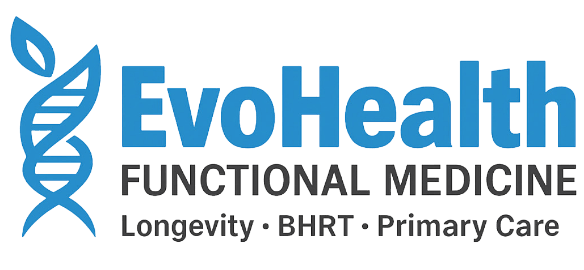Building a PCOS-Friendly Diet: What to Include and Exclude for Hormonal Harmony
Polycystic Ovary Syndrome (PCOS) is a common hormonal disorder that affects a woman’s reproductive and overall health. While there is no cure for PCOS, lifestyle modifications, including dietary choices, can play a significant role in reducing symptoms and improving overall health.
At EVOHealth, we want to empower each of our patients to live their most vibrant lives. Nutrition is part of that journey. In this article, we will explore what to include and avoid in a PCOS-friendly diet, shedding light on the reasons behind these choices and how they can positively influence the hormonal imbalance associated with PCOS.
Foods to Include in a PCOS-Friendly Diet
High-Fiber Foods: Whole grains, legumes, fruits, and vegetables.
High-fiber foods help regulate blood sugar levels by slowing down the digestion and absorption of carbohydrates. This prevents rapid spikes in blood sugar, and subsequent crashes, which can contribute to insulin resistance—a common issue for those with PCOS.
Lean Proteins: Skinless poultry, fish, tofu, and legumes.
Lean protein sources are essential for supporting muscle health and promoting a feeling of fullness. Additionally, they have a lower impact on insulin levels compared to high-fat, processed meats.
Healthy Fats: Avocado, nuts, seeds, olive oil, and fatty fish.
Including sources of healthy fats, particularly omega-3 fatty acids found in fatty fish, can help reduce inflammation and support cardiovascular health. This is particularly important for women with PCOS, as they may have an increased risk of heart-related complications.
Colorful Vegetables: Leafy greens, colorful bell peppers, tomatoes, and cruciferous vegetables.
Vibrant, colorful vegetables are rich in antioxidants and phytochemicals, which can help reduce inflammation and oxidative stress associated with PCOS. Additionally, cruciferous vegetables like broccoli and kale support liver function, aiding in hormone metabolism.
Low-Glycemic Fruits: Berries, cherries, apples, and pears.
Choosing fruits with a lower glycemic index helps manage blood sugar levels. Berries, in particular, are rich in antioxidants and fiber, making them an excellent choice for those with PCOS.
Dairy Alternatives: Almond milk, coconut milk, or lactose-free dairy.
Some women with PCOS may be sensitive to dairy, and choosing healthy alternatives can help manage symptoms. Additionally, incorporating good sources of calcium is important for bone health.
Herbs and Spices: Turmeric, cinnamon, and spearmint tea.
Certain herbs and spices, like turmeric and cinnamon, have anti-inflammatory properties and may help regulate insulin sensitivity. Spearmint tea has been associated with a reduction in androgen levels, addressing one of the hormonal imbalances in PCOS.
Foods to Avoid in a PCOS-Friendly Diet
Refined Carbohydrates: White bread, sugary cereals, and processed snacks.
Refined carbohydrates can lead to rapid spikes in blood sugar levels, contributing to insulin resistance—a common issue with PCOS. Opting for whole grains instead provides a more steady release of glucose into the bloodstream.
Sugary Foods and Beverages: Soda, candy, and baked goods.
Excessive sugar consumption can exacerbate insulin resistance and contribute to weight gain, which may worsen PCOS symptoms. Cutting down on sugary foods and beverages is crucial for managing blood sugar levels.
Processed Meats: Sausages, hot dogs, and bacon.
Processed meats are often high in saturated fats and additives, which can contribute to inflammation and negatively impact cardiovascular health. Choosing lean protein sources is a healthier, more beneficial option.
Highly Processed Foods: Ready-to-eat meals and fast food.
Highly processed foods often contain trans fats, preservatives, and high levels of refined sugars, all of which can contribute to inflammation and hormonal imbalances.
Dairy (for some): Cow’s milk and high-lactose dairy products.
Some women with PCOS may be sensitive to dairy, so cutting back on these products can help alleviate symptoms such as bloating and digestive issues. Opting for the dairy alternatives listen above may be a more suitable choice.
Excessive Caffeine: High-caffeine energy drinks and excessive coffee consumption.
While moderate caffeine intake is generally considered safe, excessive consumption can disrupt hormonal balance and contribute to increased stress levels, potentially exacerbating PCOS symptoms.
Alcohol: Beer, wine, liquor. Alcohol can impact liver function and hormonal balance. Women with PCOS should consume alcohol in moderation or avoid it altogether to support their overall health.
Understanding the Impact of Your Diet
The foods you include and avoid in a PCOS-friendly diet are not based on arbitrary choices. They directly influence hormonal balance and metabolic function. Whole grains and lean proteins support stable blood sugar levels, reducing insulin resistance. Colorful vegetables and anti-inflammatory foods combat oxidative stress and inflammation, common culprits in PCOS. On the flip side, processed foods, sugary treats, and refined carbohydrates can exacerbate insulin resistance, while certain dairy products and excessive caffeine may disrupt hormonal harmony.
EVOHealth is here to help you recognize what foods you should include or avoid in a PCOS-friendly diet. Dietary modifications, along with other lifestyle changes, can help patients effectively manage the symptoms of PCOS and other disorders. Contact us today to find out how!
